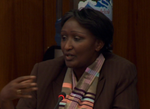Françoise NGENDAHAYO
contribution 31 -
NGENDAHAYO Françoise

transtlated version
Thank you, Mr. Chairman. I just want to highlight what the interpreter said by citing I had the privilege of following the Akayesu case some time ago, where a victim, a witness, was unable to mention what’s related to sexual violence because of the sensitivity of the translation in her language. In that case, an inadequate interpretation may slow down the trial. For instance, in the Rwandan culture, the word "sexual violence" may be interchangeable with the word "marriage". A woman, on whom sexual violence is exercised, may actually say "I was married." So it took some time for people to understand the slight differences.
So, as Mr. Kwende said, he mentioned social and cultural knowledge of the country at the investigations stage. So it is important to have the right technology from the investigation phase right up to the judgement, because if the use of words slows down the proceedings, there are also words that may also lead to a wrong legal interpretation. For instance, the word “kurongora”, as I said, it’s some kind of trivialization of sexual crimes in our country. They were considered normal, like a “kind of marriage”.
So it shows you just how far the philosophy of rape is almost tolerated in our culture. And maybe the persons who committed those rapes do not think anything of it. They thought it was something like “war loot”. So a better knowledge of the culture could give deeper explanations to the proceedings in court.
J.M. SOREL
Thank you, Madam, for those important explanations. I did not know them. I found them very interesting. Giving insight on the different possible meanings, and the consequences on the indictments.
Now, we are not going to put the Defence in the dock, but from the various papers I have read, the Defence appears to be attacked. Now its role is to defend. Now, why have they been attacked? I believe there is some ethical problem here, not individual ethics, but collective ethics and a common code of conduct. It would appear that the Defence is blamed for not having a comprehensive code of conduct. I’m only reflecting the opinion in the various papers.
Yesterday Ms. Condé mentioned the issue of negationism, which could be finally related to the role of the Prosecutor. It would appear that there is a problem on that score. There is also the problem of the stress between the perfect culprit and the one who wants to be cleared at all costs. What the defence attorney is supposed to do: searching the truth or clearing his client?
What is the relationship between what I may call a “Vergès” syndrome. That is a well known Defence attorney who would do everything he could to clear his client, event if he has to borrow a shocking attitude.
About the Defence, there is also an important point mentioned in the paper of Roland Amoussouga about this memorable judicial decision in June 2006 admitting legally the existence of the genocide. The work might have been easier if this had been realised before. Be that as it may well there are other problems.
I wanted to give the floor to Madam Florida Mukeshimana, with her leave, of course. In her paper she mentioned an interesting testimony. I may summarise it by saying that maybe it is virtually under attack, but I would like her to explain further. Madam, please.

